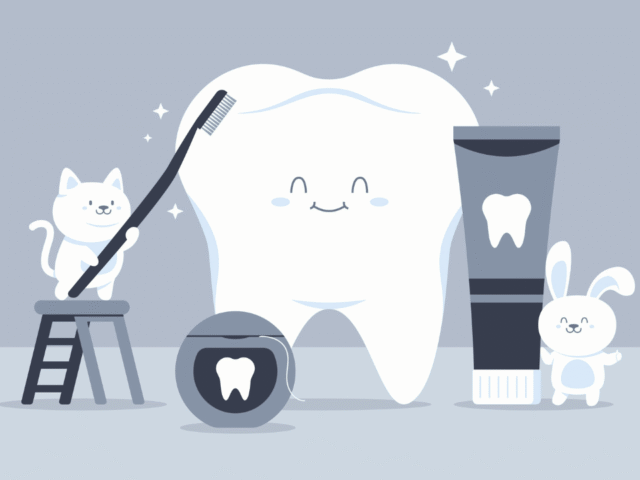
Image via Freepik
When people think of oral health, they often focus only on teeth, avoiding cavities, brushing regularly, or maybe getting braces. But what if keeping your mouth clean could also protect your stomach and intestines? Surprising as it sounds, it’s true that your mouth-gut connection are more connected than most people realize.
This World Oral Health Day, Prof Seo Liang Lin, Dean of the School of Dentistry at IMU University, is urging Malaysians to look beyond just their smiles. She explains that the bacteria in our mouth don’t just stay put, they can travel and disturb the balance of our gut, setting off a chain of health problems.
Oral Bacteria is A Hidden Threat to Your Digestive System

Image via Freepik
Your mouth is home to millions of bacteria, some good, some bad. When oral health is neglected, harmful bacteria from gum disease can enter the bloodstream or survive the journey through stomach acids. Once they reach the gut, they disrupt the healthy bacteria that support digestion and protect against inflammation.
Prof Seow explained, “It is medically well-established that patients with gun disease are more likely to have inflammatory gut issues such as inflammatory bowel disease (IBD) and Crohn’s disease.” In other words, what begins as bleeding gums could end in something far more serious.
Even more concerning, harmful bacteria in the gut can release toxins that trigger inflammation and damage the gut lining. This lowers the number of good bacteria that help us digest food and fight off disease. When this balance breaks down, symptoms like bloating, constipation, or even autoimmune issues may appear.
A Two-Way Street Between Your Mouth and Gut

Image via Freepik
The connection isn’t just one-way. Gut problems can also affect your mouth. One clear example is acid reflux or GERD, where stomach acids move up the food pipe and into the mouth. This acid can wear down your tooth enamel, causing tooth sensitivity, permanent damage, and even loss of tooth structure over time.
Interestingly, researchers have also discovered that people who lose teeth tend to have fewer specific types of gut bacteria called Faecalibacterium. These bacteria are important because they produce short-chain fatty acids that reduce inflammation throughout the body.
In addition, poor oral health often leads to chewing difficulties. People who lose teeth or suffer from gun pain may avoid eating fiber-rich food like meat or vegetables. Instead, they choose processed, softer foods that are easier to chew but far less nutritious. Over time, this change in diet can cause constipation or malnutrition, which further weakens the gut.
What’s Harming Your Mouth and Your Gut

Image via Freepik
Another major contributor to poor oral health is smoking. Smoking reduces blood flow to the gums, weakens the immune system, and increases inflammation. This makes it easier for gum disease to start and harder for your body to fight off infections, both in the mouth and in the gut.
Stress also plays a role. When we’re stressed, we might grind our teeth or skip proper brushing and flossing. At the same time, stress hormones affect gut health, leading to flare-ups of digestive conditions like IBS. In both cases, the result is more inflammation, more bad bacteria, and more health complications.
Why Prevention Starts with the Dentist

Prof Seow Liang Lin, Dean of the School of Dentistry at IMU University
So, what can you do to protect both your oral and gut health? The first step is to take your dental check-ups seriously. Prof Seow advises that while once-a-year visits are a good baseline, those with existing dental issues, braces, or prosthetics may need more frequent care perhaps every six months or even quarterly.
Unfortunately, gum disease is often silent. It doesn’t cause pain until it’s too late. Bleeding gums might seem like a minor issue, but they’re often the first warning sign of deeper problems. Once the bone that holds your teeth in place begins to deteriorate, the damage is irreversible.
“Having a regular dentist who knows your history makes a big difference,” Prof Seow added. “They can guide you on the right oral care solutions and detect issues early, before they spread beyond your mouth.”
A Healthy Smile for a Healthy Body
As science continues to explore the link between oral health and the rest of the body, the message is becoming clear, your mouth is the gateway to your overall health. A clean, healthy mouth supports better digestion, reduces inflammation, and helps you maintain a strong immune system.
Neglecting it can open the door to silent, long-term problems and not just in your gut, but throughout your body. From daily brushing and flossing to regular check-ups, good oral habits are a powerful way to protect your health inside and out.
If you haven’t visited your dentist in a while, now’s the time. Your body will thank you not just with a brighter smile, but with better health from head to gut.
Love reading more article like this? you might like Malaysia’s youth face a growing vaping crisis or Fertility Is No Longer Just About Biology










